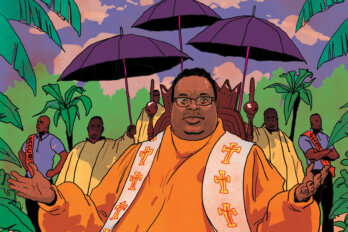Mom taught Sunday school when I was a child. When she was around children, she came to life. She created all these interactive songs that would get every six-year-old and their brother hyped on Jesus. We went to church every Sunday in rooms swollen with the spirit and full of gospel songs that we sang in Cree. Mom was a proper woman who bent over backward for her kids. She tended gently to other people’s children. And those kids flocked to her. Mom had a knack for knowing how to make them feel special. She showed the troublemakers extra attention and an extra dose of gentleness. It made them take a liking to her, and they smartened up real quick in her presence. On school trips, Mom always sat with the class outcasts. The ones who were poorer than us and had stringy unwashed hair. I remember being upset about sitting alone in a school-bus seat while Mom sat with Gladys and Todd behind me. Mom knew those kids needed some additional love, and she didn’t let my pouting get in the way of her giving it to them.
When I was in kindergarten, she made me clothes and matching accessories by hand. I was the object of adoration for many years because Mom always went above and beyond when dressing her little princess. Mom grew up poor and told herself, “No white people will ever look at my children like dirty Indian kids.”
Those are good memories.
But the memories of my mom shape-shifted into something else entirely for a period of time.
My first year as a teen, I was enough trouble to have to be shipped away to Prince George. That was also the year my mom started to drink.
I know she spent too many late nights stressing over whether I would be alive in the morning when I took off drinking. She would spend hours combing the streets to find me. She tried to be strong for me and broke under the weight of it all.
When I returned home from Prince George, six months later, my mom had disappeared.
Instead, I found an angry drunken woman living in her skin.
Us Native women know how to disappear. It’s an art, really—we can disappear even when we are right in front of your face. Sometimes on purpose, sometimes for safety, sometimes by force, and sometimes because we can’t see ourselves anymore.
Most of the women in my family have battled depression. Most of the women in my family have lost this battle at some point in their lives and vanished somewhere deep inside themselves.
This was Mom’s era of defeat.
My dad was absolutely consumed by work. His desire to give us what he never had took him completely away from us. Funny how that works. His presence in the household was a rare sight. Mom disappeared and Dad pulled a vanishing act. That separation only deepened the divide between my mother and sobriety. When he was home and she was drunk, which was often, she would follow him around the house screaming obscenities at him.
“Bastard,” she would yell. “You’re a fuckin’ bastard.” My dad would cuss a few times back at her before I would hear the clinking of his keys and the slamming of the front door. I always wondered where he would go. I would wait to hear the door open again and to hear his voice calling us, so we could leave with him. But he never did come back for us, and it always hurt to be abandoned by him and left with my mom. I knew that sometimes he didn’t go anywhere. He just slept in the truck in the driveway. Even so, I still wanted him to take us away, even if it was just ten feet outside of the madhouse in which we lived back then.
My littlest brother would always be the one to de-escalate Mom and speak soothing words to her. I disliked her during those moments. It’s because I saw so much of myself and my inability to stay sober in her and her life. I think she saw the same in me, and she damn well didn’t like it either. We were each other’s reflections of our own failures. So when Dad left, I became the target of the whisky death machine that controlled her. She would then follow me around the house and call me names until I locked myself in my room or my brother whisked her away.
My struggle wasn’t isolated.
I remember staying at a friend’s house one time and the same scenario breaking out. Her father locked himself in the bathroom, and I could hear her mom calling him a bastard while she pounded on the door. We snuck out of the house when they moved the argument downstairs. We put her little brother in the back of my mom’s car, which I had borrowed for the night. I was sixteen and finally had some freedom in the form of a licence. We all slept in my bed that night because my home, for once, was actually quiet.
The fighting and yelling seemed like normal behaviour among a lot of the Native friends I had. I didn’t have any white friends once I became a teenager, so I didn’t know what their homes were like. I had naively imagined that their homes were the kind that served hot cocoa on days when you needed it. Their homes were the kind that had hot water year-round and a working furnace. In this kind of home, they probably had a family game night where the mom made turnovers or popovers or whatever shit white people make for their kids. The dad would chuckle, “You little rascal,” while he messed up his son’s hair with his hand. The dad would let his son win the board game. In my mind, white homes had a monopoly on family happiness.
One time, I came home from school at lunch to find Mom drunk and as angry as a woman scorned ten times over. She was eating the hamburgers she had made the night before, without buns, and with the kitchen island between us, I was feeling pretty tough.
“Just go to bed,” I spat my words at her.
“Don’t tell me what the fuck to do! I’m your mother,” she yelled as she swayed and took another bite of her hamburger.
“Then act like it,” I muttered.
Her eyes went large and she threw the half-eaten hamburger at my head, and I had to laugh because a hamburger was being thrown at my head. My laughter set her off. Rage filled her eyes.
“Do you think this is fuckin’ funny?” she questioned. Her words were pointed but her legs were wobbly as she moved toward me. I was instantly scared and regretted saying anything.
My mom is not a woman to be fucked with. Drunk or not. She could clean the floor with any man’s head if she wanted. I grabbed the house phone off the counter and headed down the hallway. I heard her heavy footsteps coming behind me, so I moved quickly until I reached the bathroom. I locked the door behind me, pulled out all of the drawers in front of the door, and called my dad. She stood on the other side of the door banging on it and taunting me.
“Go ahead, you big fuckin’ baby. Call your dad. Cry, cry, cry.”
My dad did not answer.
I sat in the bathroom until I couldn’t hear her stumbling around the house anymore. Then I made my escape. I walked to my auntie’s, the winter air biting my cheeks as tears rolled down.
Liquor seeped into every aspect of our family’s lives.
Before Mom started drinking, she was damn near a saint. She was a woman devoted to her family who went the extra mile in church and for others. She made the best apple pies for miles in any direction. No one had seen it coming. I guess no one ever does.
My cousin on my dad’s side once made the remark: “It’s funny how Helen grew up going to church and we didn’t. But she’s the one who turned out to be the alcoholic.”
Estranged cousin irony points: one.
Another irony? Dad was a preacher on the odd Sunday when there was a vacant pulpit. And if he wasn’t at the podium, he would testify to strangers on street corners.
It earned me the nickname “the Rev’s Dev,” short for the Reverend’s Devil.
I was a living oxymoron.
It wasn’t the usual case of preacher’s daughter gone wild, where the daughter is given no trust at all and finally grows a pair and rebels. I was given a lot of trust, and I just chose to do shady things. And my mom? Well, her addiction swallowed her and drank her up until she was bone dry. My brothers and I would comb the house for her stash when she was passed out. We’d empty vodka bottles until only an inch of liquor remained and refill them with water.
“You think she’ll notice?” my youngest brother would ask nervously.
“Who cares!” my other brother would say as I’d screw the cap back on.
We would hide beer bottles and pray that she thought she drank it all the night before. Not that it mattered because she would just buy more. There was a limitless supply of liquor out there. I learned to hate the sound of clinking beer bottles and the song “Moonlight Eyes” by Nazareth. It meant she was going on a bender.
To this day, there are ’80s songs that still trigger me.
Mother eventually became full of her grief. Too full. Her cup runneth over. She became suicidal.
My youngest brother would always try to calm her down and put her to bed. He would find the knife that she’d hidden under her pillow and put it away. Or he would grab the giant plastic bag full of pills she had amassed earlier and place them back in the medicine cabinet. He was a ten-year-old doing palliative care work. He did it all alone. I had my own issues with addiction and my other brother isolated himself.
He would plead with me not to react to her when she was inebriated and angry.
“Please, Helen,” he begged, his big brown eyes filled with tears. “Don’t say anything back. It’ll only make it worse.”
Sometimes I would bite my tongue just for him. Other times I would unrein it and let it lash out at her, which resulted in more yelling and me locking myself in a room with her fists on the other side of the door. Really, though, I was so fucked up. I wanted her to be there for me, but I was never there to protect my brothers. We all absorbed the shocks of her alcoholic tremors in different ways. And when they shook the house, we fell divided.
There would be bouts of sobriety when all would be well in the house. There would be a surplus of money for groceries and Mom would make elaborate meals with desserts prepared from scratch. We would eat at the kitchen table like a real family, like we had always done throughout our early childhood. My brothers would be happy, and I would be able to focus a little more clearly at school. We would all quietly wonder if this was a turning point, and sometimes we dared to hope it was.
But the dread always crept back in.
The night would take on the ambience that we had just spent the last week trying to forget existed. Music would play, cigarette smoke would waft into our rooms, and she would cry if she couldn’t get angry at anyone. Mom cried a lot. I think she just wanted to be loved and to truly love herself. Sometimes an auntie or someone else would come over and eventually they would end up crying together. It was a moonlit 3 a.m. family revival where people got redeemed and cried the tears they couldn’t acknowledge when they were sober.
I was seventeen when I watched her being wheeled off on a stretcher.
I had to call an ambulance after finding her lying in her bed, more incoherent than usual. I scanned the room and noticed pill bottles that were tipped sideways and lay empty. She had swallowed them all. A rainbow of death. I sat beside her while I screamed for my dad. Her hands felt cold and damp like a winter-kissed window. Her lips blushed blue and grey. She said she could see her uncle who had passed away years before. He wanted her to go with him. Great-Grandpa was there too, she said. She was talking to them.
“I’m ready to leave,” she said, her eyes looking past me.
“Mama!” I yelled through my tears as I shook her. “Mama. Stay with me. Stay with me, please.”
“Uncle. Grandpa.”
“Nooooo!” I screamed as I gripped her hand. “No, no, no. Look at me, Mama. Look at me! You need to stay here. Stay with us, Mama.”
Her eyes would slowly close and I would shake her till they opened again. Her body was so cold.
“You can’t take her. You. Can’t.” I choked the words out as I held onto my mother and cried. I could barely catch my breath as my anxiety rose higher and higher. It couldn’t end like this.
“No, no, no, no . . .” I repeated over and over.
Dad was beside me yelling words at her, trying to get her to stay up. Finally, the medics arrived and I left the room while they hauled her out.
My dad and I stood at the window as the ambulance drove away. The sun was just rising. The world was quiet. And the silence that was left in its wake? It was deafening.
From the book In My Own Moccasins: A Memoir of Resilience by Helen Knott, copyright © 2019. Reprinted by permission of University of Regina Press.





